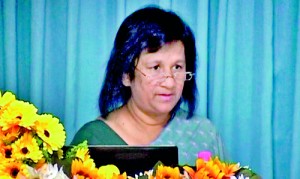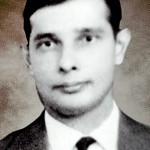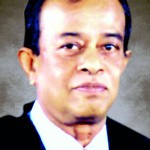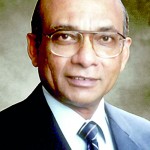Sunday Times 2
Veterinary Science pioneers felicitated
A felicitation ceremony was organised recently at the state-of-the-art Veterinary Teaching Hospital (VTH) in Peradeniya in appreciation of the work done by the former teachers of Veterinary Science. Professor Indira Silva, Head of the Department of Veterinary Clinical Sciences which manages the VTH, speaking to the Sunday Times, reminisced about the arduous path that was traversed by the pioneer teachers to reach their present advanced position of teaching Veterinary Science.
it was decided to have this felicitation, a ‘guru pooja’ by the grateful students to their beloved teachers after many discussions with the organising committee comprising Dr. Niranjala de Silva, Dr. Ashoka Dangolla, Dr. Eranda Rajapaksha, Dr. Nayana Wijayawardhana, Dr. Manjula Jayasinghe and Dr. Harsha Ariyaratne, said Prof. Silva.

Professor Indira Silva
The Department of Veterinary Clinical Sciences felicitated three former teacher of small animal and wild animal practice, the late Prof. Peter Seneviratne, Prof. George E. Kodituwakku and the late Prof. Vijitha Kuruwita. Their photographs were unveiled in the auditorium of the new VTH by their wives Sakuntala, Wimala (as Prof. Kodituwakku was unable to be present) and Sujatha respectively, in the presence of the Vice Chancellor of the University of Peradeniya, Professor Atula Senaratna, the Deputy Vice Chancellor Professor Shantha Hennayake, Deans of the Faulty of Medicine, Prof, Lamawansa, Faulty of Science Professor Anura Wickremasinghe and Registrar of the University Dr. Nisshanka Jayawardene.
The auditorium of the new VTH was declared the ‘George Kodituwakku Auditorium’ and the wild animal treatment unit as ‘Vijitha Kuruwita Transit Home for Wild Animals.’ Prof. Indira Silva spoke of the work done and the achievements made by these three Professors in the field of small animal and wild animal clinical practice in Sri Lanka.
Peter Seneviratne was the first Sri Lankan veterinarian to join the University in 1953, following his bachelor’s degree from the University of Madras in 1951 and taught veterinary medicine and parasitology for over 22 years.
He was conferred a PhD from the University of London in 1957 and became a member of the Royal College of Veterinary Surgeons (MRCVS) in 1964. As the first Registrar of the Veterinary Council, he was instrumental in preparing and implementing the Veterinary Surgeons & Practitioners Act. He was also the President of the Sri Lanka Veterinary Council and served as President of the Sri Lanka Veterinary Journal and became its Editor in 1965.
Prof. Peter Seneviratne was appointed the Professor in Veterinary science in 1966 and served as the Dean of the Faculty of Agriculture and Veterinary Science from 1966 to 1972. He designed the detailed syllabus for Veterinary Medicine in 1967 and initiated the Higher Degree programme in Veterinary Science in 1967.
After he moved to Australia, he visited Sri Lanka to accept several honours in 1988: Doctor of Science, honouris causa from the University of Peradeniya, Guest of Honour at the 50th annual sessions of the Sri Lanka Veterinary Association (SLVA), and National award for services to the livestock sector in Sri Lanka – 50th Independence celebrations.
Veterinary Studies in Sri Lanka germinated in the Medical Faculty at Kynsey Road, Colombo with two students in the first batch – George Ellenson Kodituwakku, a past pupil of Richmond College, Galle and P.L.G. de Silva. George Kodituwakku graduated with First Class honours in 1953 and soon after was employed as Veterinary Surgeon in the Government Veterinary Hospital in Peradeniya from 1953 to 1955.
During those early years, he was a visiting lecturer in Veterinary Surgery where he started his research work and the very first volume of the Ceylon Veterinary Journal 1953 has his publication “Pulmonary embolism causing sudden death of cow secondary to thrombo-embolism and chronic phlebitis of posterior vena cava.”
 Professor George E. Kodituwakku |
 Professor Vijitha Kuruwita |
 Professor Peter Seneviratne |
Prof. Kodituwakku had an impressive career and was promoted to Professor of Veterinary Clinical Studies in 1969. He was conferred the PhD in December 1959 from the University of London and Doctor of Tropical Veterinary Medicine from the University of Edinburgh in July 1960. His expertise in animal obstetrics and reproduction was further heightened through a Postdoctoral Research Fellow on a Fulbright-Hays fellowship to Washington State University in USA from July 1967 to September 1968.
Prof. Kodituwakku was the Head of Department of Veterinary Science from July 1973 and was appointed as the Chairman of the School of Veterinary Science of the Faculty of Medical, Dental and Veterinary Science in June 1974. He was the first Head of Department of Veterinary Clinical Studies of the newly established Faculty of Veterinary Medicine and Animal Science in 1980, which post he held until 1983. Following his retirement from the University service in 1989, he was awarded Professor Emeritus on December 21, 1993.
Prof. Kodituwakku has an equally impressive professional profile. He was the President of the Ceylon Veterinary Association (now Sri Lanka Veterinary Association) in 1965, a member of the Veterinary Council of Ceylon from 1962- 1967 and was a member of the Editorial Committee of the Sri Lanka Veterinary Journal (SLVJ) from 1965. He was felicitated by the Sri Lanka Veterinary Association on May 3, 2002 at a grand ceremony held at Hotel Tourmaline in Kandy.
“Prof. Kodituwakku was surgeon par excellence and modesty is one of his virtues. Even on retirement he was the most sought after practitioner in Colombo. In recognition of his many contributions to the upliftment of pet animal practice in Sri Lanka, the auditorium of the new Veterinary Teaching Hospital in Peradeniya was declared as “George Kodituwakku Auditorium.”
Prof. Indira Silva next spoke of late Prof. Vijitha Kuruwita who was more popularly known as “Kuru”. He studied initially at Isipathana Vidyalaya and later at Royal College, Colombo and entered the Peradeniya Campus of the University of Ceylon in 1968. He graduated in 1972 and was immediately taken on to the academic staff of Veterinary Clinical Sciences. He was conferred the PhD in 1981 from the University of Massey, New Zealand.
During his student days, he was the President of the Ceylon University Veterinary Students’ Association in 1971 and a member of the University Cricket team which played for the Sara Trophy. He continued to play cricket in New Zealand for the Manawatu District in the Kia Toa Cricket team, and was popular as a left arm unorthodox spinner.
He followed in the tracks of his guru and mentor, Professor George Kodituwakku in veterinary surgery and medicine. He became the Head of Department initially from September 1983 to December 1984 and again in February 1988 and continued for three terms. During this period he upgraded the small animal practice and clinical training in 1990 from 2 hour clinics to a hospital that was kept open for the public 24/7. This new hospital was able to increase not only the clinical training of students but also strengthened the local and international research capacity of the department members, which resulted in many awards credited to the VTH. Prof, Kuruwita was the Dean of the Faculty from 1993 to 1998. He succeeded Prof. Kodituwakku in the post of Professor of Veterinary Clinical Science (Cadre Chair) on 26 March 1994.
On many occasions, the Government of Sri Lanka consulted Prof. Kuruwita on importation of animals – to select draft dairy animals for the Mahaweli Livestock programme from Pakistan (1986/87), to select a tusker to the Sri Dalada Maligawa (1988), to purchase dogs for the Sri Lanka Police from Australia (1992) and from United Kingdom (1996).
Prof. Kuruwita was the most sought after veterinarian on elephant medicine. His untiring efforts with his team of veterinary doctors and students who worked to maintain good health of the Sri Dalada Maligawa tusker ‘Raja’ in 1988 was widely publicised on national and international television media. The photographs of those events can be seen at the Sri Dalada Maligawa Museum dedicated to ‘Raja.’ He developed the elephant tranquillising unit which operates at various peraheras which was initiated by the Faculty and later introduced to the government Department of Animal Production and Health.
The first cataract surgery on an elephant was initiated by Prof Kuruwita in 1990 which was also telecast on BBC. The elephant was totally blind on both eyes. The lens of one eye was removed so that he was able to see from a fixed focal length. Prof. Indira Silva stated that she was present at this operation. She explained that Professor Kuruwita and the veterinary team anaesthetised the elephant and Dr. A.B. Abeysinghe, the eye surgeon in Kandy performed the operation.
In 1999, Prof. Kuruwita proceeded to Wayamba on secondment to upgrade the Wayamba Campus of the Rajarata University to the thirteenth National University in Sri Lanka. He was the first Vice Chancellor of the University of Wayamba, which post he held for two terms until September 2005, but at a great cost to his health which he neglected during those tiring days away from his family and loved ones. His first challenge was to upgrade the two year Diploma course to the Degree status. The second challenge was to upgrade the campus to a University status with four (4) faculties – Applied Sciences, Agriculture & Plantation Management, Business Studies and Finance, and Livestock, Fisheries & Nutrition. He was able to register two batches each for those Faculties.
He is credited for reviving the wild animal medicine clinical training programme for students at Peradeniya. His colossal contribution to wild animal health and his guidance led to the revival of the wild animal medicine course. Prof. Kuruwita encouraged and inspired his subordinates to publish scientific publications of international standard, some of which are cited in many wild animal medicine books.
With his untimely death on April 1, 2007, the Department of Veterinary Clinical Sciences at the University of Peradeniya lost a senior colleague, a good veterinarian, an experienced practitioner and most of all a good friend, stated Prof. Silva.
In recognition of his many contributions to the Department, Sri Dalada Maligawa and the Department of Wildlife Conservation, the wildlife unit of the newly established Veterinary Teaching Hospital was dedicated to his memory as “Vijitha Kuruwita Transit Home for Wild Animals.”
Dr. Ashoka Dangolla in his vote of thanks related many anecdotes during his trips to the wild with Prof. Kuruwita and their dangerous encounters with wild elephants, some of which were shown on the big screen with the audience watching spellbound.
Prof. Indira Silva is thankful to the members of the VTH Development Committee -Wasantha Nugegoda, Ms. Champa Fernando, Mohan Samarakoon, Dr. Amal Karunaratna, Prof. Sarath Illangantilake and Prof. V. Nandakumar for the encouragement given to continue improving the VTH and their sponsors Gamma Pharmaceuticals (PA) Ltd. and Stassen Foods.

